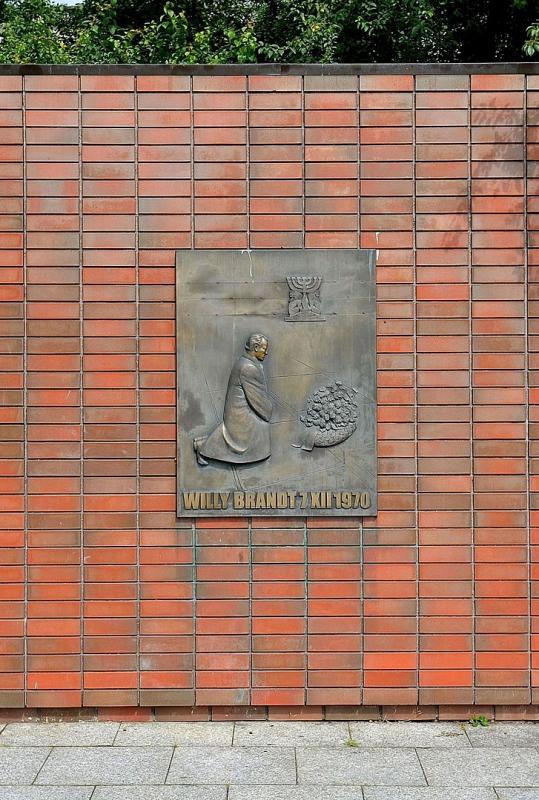Head northeast on Miła toward Dubois, turn right onto Ludwika Zamenhofa, turn right onto Józefa Lewartowskiego, the monument will be on your left (450 m)
4. Willy Brandt Monument
Stories
Directions
Willy Brandt’s legacy
Willy Brandt was a German statesman, leader of the Social Democratic Party of Germany and Chancellor of the Federal Republic of Germany from 1969 to 1974. In 1971, he was awarded the Peace Nobel Prize for his efforts to reconcile the countries of the former Soviet bloc and West Germany. As a member of the German Young Socialists’ Federation he encouraged the creation of a Popular Front against Hitler and in 1938 he attended the Conference of the Committee of the German Opposition that took place in Paris. Expatriated from Germany, he became a Norwegian citizen. In 1940, as a Norwegian soldier he was a German prisoner. In 1970, Brandt traveled to Poland where he signed the Treaty of Warsaw, a treaty between the Federal Republic of Germany and Poland in which the two countries recognized each other on a diplomatic level and abandoned all territorial claims. The Brand Monument commemorates the visit and the famous kneeling of Willy Brandt in front of the monument of the Ghetto Heroes. It was unveiled in December 2000 and designed by Wiktoria Czechowska-Antoniewska and Piotr Drach.
An act of forgiveness
At the time of his visit to the Ghetto Heroes Monument, Willy Brandt knelt in apology in front of the monument. His spontaneous gesture is popularly known as the Warschauer Kniefall and considered as a symbol of reconciliation. Several years later, Brandt confessed: “Under the weight of German history, and carrying the burden of the millions who were murdered, I did what people do when words fail them”. Egon Bahr, German politician, ally of Willy Brandt and supporter of the reconciliation between Germany and the eastern countries, who was witness to the event recalled: "The only thing he said was that, as he stood looking at the ribbon, he thought: Just laying the wreath is not enough". After Brandt’s act, the German magazine Der Spiegel reported: ‘’Then he commits himself to a debt, which he himself is not carrying, and asks for forgiveness, which he himself does not need. Then he kneels down for Germany’’.
Kniefall and public opinion
Willy Brandt’s Kniefall was applauded by the international community and marked the beginning of publicly addressing apologies. One month after this act, Time Magazine elected Brandt man of the year. However, the German public reacted in a controversial way. The German press affirmed that ‘’they were handing themselves over to the communists’’ and regarded this act as a ‘’gesture of humility on enemy ground’’, characterizing Brandt as a ‘’traitor’’ whose political stance towards Poland and other countries of East Europe was also heavily criticized. But Brandt won the elections in 1972 contributing to the boosting of Germany’s status on an international level.
Answer this!
The monument was inaugurated in
Powered by Clio Muse Tours
